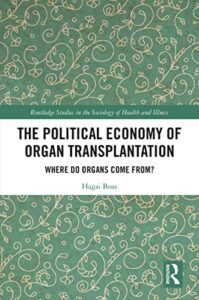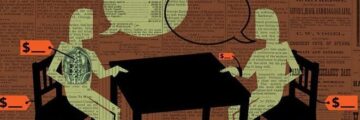 I recently finished The Political Economy of Organ Transplantation, written by the Israeli sociologist Hagai Boas and published by Routledge, and highly recommend it. Hagai is a four-time organ transplant recipient (technically, five, I suppose, since his most recent transplant, in 2020, was of both a kidney and a liver). He is the director of the Science, Technology, and Society unit at Van Leer Jerusalem Institute. He is also a senior lecturer in the Department of Politics and Government and a research fellow at the Health, Humanism, and Society Center of the Negev, both at Ben-Gurion University of the Negev.
I recently finished The Political Economy of Organ Transplantation, written by the Israeli sociologist Hagai Boas and published by Routledge, and highly recommend it. Hagai is a four-time organ transplant recipient (technically, five, I suppose, since his most recent transplant, in 2020, was of both a kidney and a liver). He is the director of the Science, Technology, and Society unit at Van Leer Jerusalem Institute. He is also a senior lecturer in the Department of Politics and Government and a research fellow at the Health, Humanism, and Society Center of the Negev, both at Ben-Gurion University of the Negev.
As already mentioned, Hagai has received a total of four transplants: one from his father, one from his mother, one from a black-market purchase, and one from a deceased donor in Israel. These transplants represent what Hagai characterizes as the three political economies of organ transplantation: the family, the market, and the state. Each of these political economies is discussed in detail in the book.
The book raises far too many important themes for me to summarize them all here, and Hagai will be a guest on The Taboo Trades podcast shortly, so you can hear more detail there in the coming weeks. But, in brief, here are a few of the points that I found very interesting, all of which I’m sure we’ll discuss in more detail on the podcast.
- Every discussion of transplantation is a discussion about relationships—specifically, couples:
“Every piece written about transplants is about couples: Me and my donor, me and the family that donated its son’s organs, me and the guy who sold me his organs, me and my family. For transplant recipients, the matter of dependence on others can’t be denied” (p. xii)
As Hagai notes, this realization is in some ways counter-intuitive, because we are living in an era that celebrates individual heroism, including in the realm of organ donation and transplantation.
- The privatization of organ transplantation
Hagai persuasively documents an increasing privatization of the political economy of transplantation: “The shortage of organs leads patients to turn to their acquaintances, relatives, and those who admire them, or, alternatively, organ merchants. In all of these cases, the search for an organ for transplantation is a do-it-yourself project.” (p. xvi)
Hagai understandably views this privatization as troubling, given its reinforcement of a variety of inequalities (money, social capital, social networks, strength of community ties, and different kinds of social solidarity – and, in the age of social media, celebrity, attractiveness, and other traits). But I am less optimistic than he appears to be about the possibilities for public and/or broad-based solidarity efforts to alleviate the organ shortage.
First, for some people, these networks and connections are a motivation to donate – many people feel a desire to donate to someone within their social network, religious community, or with whom they share a similar background that they don’t feel with an anonymous stranger. The ethics of living donation thus presents a tension between facilitating the “private” connections and mechanisms that result in more donations but that may also increase inequality in troubling ways. Hagai, of course, is well aware of that tension, especially in the context of the orthodox Jewish community, which he has written about in other work as well. (It is an issue I have worked on as well. See, e.g., this articleabout my work with the Duke divinity school on the possibility of encouraging donations within religious communities).
Second, I am not optimistic that opt-out or presumed consent systems, standing alone, will significantly reduce the organ shortage. I have nothing against presumed consent in principle—I just don’t think the evidence supports its effectiveness. For example, Arshad et al find that opt-out countries have fewer living donors per million population with no significant difference in deceased donors. And even some studies that find increased donations from a change to opt-out acknowledge that they do not control for important factors such as other, simultaneous changes to the law or system, or for the media attention and increased discussion of organ shortage that typically precedes or accompanies legal changes of this sort. (See, e.g., here)
I think that these facts make me more of a skeptic than Hagai, but we will see when we discuss for the podcast!
- Privilege
The concept of privilege permeates the book and each of Hagai’s transplants was the product of some sort of privilege: the privilege of having family members willing and able to donate to him; the privilege of being able to access the black market; and the privilege of living in a country with a (far from perfect) deceased organ donation system.
Of these, the second (the privilege of money and marketplace) is often talked about, whereas, in my view, the other two types of privilege are equally, if not more, important and are underexplored. But both Hagai’s first-hand account and his sociological analysis of the black market suggest that it is more complicated than often assumed. As he says, the black market is less about the rich and the poor than it is about the sick and the poor:
“Some claim that these transactions demonstrate the gap between the rich, who buy organs for themselves, and the poor, who sell their organs to survive. . . .but as a matter of fact it is not a question of rich versus poor but, but sick versus poor. . . . Indeed, these are two groups pushed by despair into organ trading.” (pp. 89-90)
- The organ shortage-black market link
Hagai does a great job demonstrating the ways in which the organ shortage causes desperate circumstances that lead those suffering from kidney failure to turn to the black market. He details this, especially in the context of Israel and the battles over brain death. Al Roth, Mike Rees, Ignazio Marino and I make a similar point in a recent article. As we state here:
“We strongly believe that international efforts should concentrate on increasing the availability of ethical high-quality live donor kidney transplantation options in all countries.
This is not the same as accepting legalized organ markets, as in Iran. But the present state of the discussion, and its legitimate concern with black markets, has become so dysfunctional that caught in the crossfire of these counterproductive discussions have been other ways of increasing the availability of legal, ethical and safe transplantation and donation. . . . Any obstacle to ethical kidney transplantation activity supports criminals because it creates demand for an illegal, unsafe, and unethical black market transplant.”
As I said, these are just a few of the very important issues raised in the book. By all means read the whole thing, and listen to my discussion with Hagai on The Taboo Trades Podcast. I’ll post a link to the episode when it airs.
